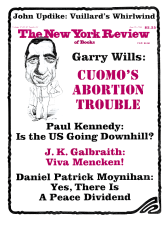In response to:
The Lost World of the Mormons from the March 15, 1990 issue
To the Editors:
Several small errors mar Diane Johnson’s fascinating review of five books [“The Lost World of the Mormons,” NYR, March 15], including my own novel The Chinchilla Farm, which deal with the subject of Mormonism.
In my novel, the main character Verna does not return to Utah at the end of the story, as Ms. Johnson asserts, but rather remains in California, “still on the rim,” as she puts it in the last sentence—referring to the Pacific rim as well as life on an edge between the sacred and profane. Additionally, that Verna ends up with a husband and child should by no means be read as an example of female submissiveness to the Mormon ideal of family or a return to old patterns, which Ms. Johnson implies.
As an admirer of Ms. Johnson’s work, I hardly wish to call her to account over petty matters but I think it worth contradicting her claim that “Mormons, unlike Australians, who celebrate their convict ancestors, are disapproving of and reticent about their polygamous history” (which included jail terms). In my experience, this is not generally the case. No one in my family showed the slightest embarrassment over the fact my great-grandfather spent six months in a territorial prison rather than give up one of his wives. A picture of him in his striped jail suit with a ball and chain around his ankle hangs proudly in our house. Unfortunately, in patriarchial societies, bedding more than one women, in or out of marriage, has always added to male stature. Contemporary polygamists are a different matter. In these ultrapuritanical times (in which purer moral codes are preached than practised), they embarrass everyone.
Finally, Ms. Johnson complains that jacket-copy writers for my novel erred in using the word “exotic” to refer to Mormon life because Mormonism is indigenous—“perhaps the only indigenous American religion.” This is true only if we discount Native Americans, which unfortunately, we usually do.
Judith Freeman
Los Angeles, California
Diane Johnson replies:
Ms. Freeman’s complaints about my respectful review of her book are somewhat puzzling. For one thing, I can’t see that I anywhere said that Verna (Ms. Freeman’s heroine) returns to Utah at the end of the story. But Verna tells us that between the events of the story and the time of writing, she returned to Utah to tend her father’s last illness and introduce Vincent to her parents; and that she remains close to her mother after her father’s death. What I said was “the author’s reward to Verna in part affirms these values: marriage, return to Utah, and—what was missing in her life with Leon—a baby.” Regarding Verna’s husband and baby, as a novelist I can sympathize with Ms. Freeman’s wish that critics would read what one had in mind rather than what one wrote. But as it is, critics and readers make of things what they will, and I suspect most readers will make of this denouement an affirmation of marriage and motherhood—however unconscious on the author’s part. At any rate, the author does not seem to be punishing her heroine.
Finally, Ms. Freeman misses the point of my comment on the use by two jacket-blurb writers of the word “exotic” to describe Mormon life. The point was that although to the rest of us Mormons often seem exotic, as evidenced by the recurrence of this word, they are in fact products of American history and values. I was interested to see, in this morning’s newspaper, that the Mormon church is changing its ritual, eliminating a part where the woman promises to obey her husband, conveniently underlining my point about Mormons following the general direction of the rest of society.
This Issue
June 28, 1990



